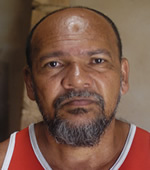 |
In the year 1956, José Cornélio de Abreu was born in the town of Campo Maior, in Piauí. His family was poor and, Master Cornélio says that back then they “had to make do. I remember that, in church, the Italian priest used to say we had to work”. And that’s how he started carving wood. “We had to build a new church. My father, who was a carpenter, made the ceiling. The priest saw me helping him and said I should make the Christ. He said I was talented. That week, a famous sculptor from Ceará, Carlos B (Barroso) visited the town. The priest read about him in the newspaper and brought him to visit me.” Without any money, together they found a branch of cashew tree and used it to sculpt the Christ. It had a bent arm, because the branch was bent. “Carlos B helped me a lot. The first pair of long trousers I ever wore was given to me by him. I used to think there was no money in art, because I didn’t know what art was. Now I understand, and I know things have to be like this: be ugly, but be yourself.” He says that in Piauí “this craft art business really got going in 1973. Back then, I cut down a flamboyant tree, carried it on my bike and made a figurehead with a donkey’s face. I took it to the craft art centre, but the director thought it was horrendous. Two days later she called me back. It had been sold to a tourist. I earned 300 cruzeiros, which was a lot of money.”
Then there was a nativity scene competition in Teresina and all the masters had entered their pieces. I watched everything. On the last day, I carved a nativity scene of my own, with all the animals. People asked why I had included a snake. But isn’t a snake an animal? I won the second prize.” Talkative, Master Cornélio defends the creative freedom of artists. “I don’t like mixing art and design. The work must be original. If you mix art with other things it gets complicated. It’s as if a steam roller drove over it, leaving everything even, looking the same. That’s not art. It’s just commercial stuff.” With the death of Master Dezinho, Master Expedito and Master Cornélio are the oldest in the tradition of saint makers and wood carvers in Piauí. |


